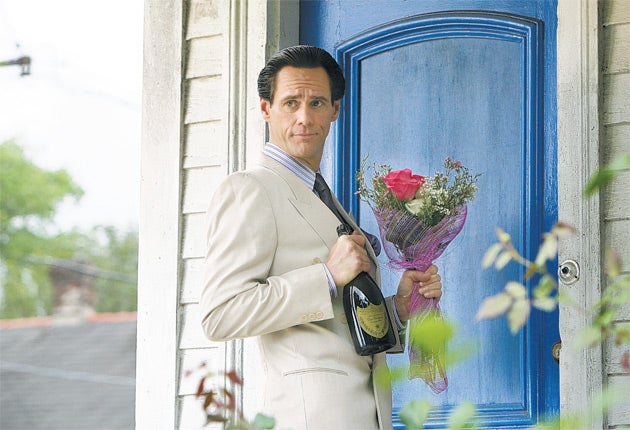I Love You Phillip Morris (15)
Catch him if you can

This must have been a tricky one to pitch. The words, "It's basically a gay prison escape movie" are not the sort a studio will rejoice to hear. And you can't imagine audiences embracing the notion wholeheartedly, either, Brokeback Mountain notwithstanding. It must have been quite a relief for the film-makers to be able to say that they had Jim Carrey and Ewan McGregor on board as stars, because the level of explicitness here – anal-sex jokes, prison-sex jokes – really is the kind that spells box-office death. What's unexpected is that the film manages to be deeply peculiar in a way that actually has nothing to do with "gayness". It is not even what interested audiences think it might be.
Its first 20 minutes scramble the senses. Jim Carrey plays Steven Russell, an apparently conventional family man with a wife (Leslie Mann), a job (local policeman) and a role in the community (Christian Texas). The first sign that he's struggling with an identity problem comes in his seeking out the mother who gave him away as a baby.
But this is only a tremor; the volcano erupts after he survives a major car accident and admits to himself that he's been "living a lie". He's gay, and he's coming out with a vengeance: he leaves his wife, his home, his work, and heads off to live as a gay divorcee in the playgrounds of the rich – otherwise known as Miami.
Eventually, he discovers that living "high on the gay hog" is going to cost him. No matter. He turns conman to fund his purchases, defrauding insurance companies and even masquerading as a lawyer. The speed at which the film bursts through family, to epiphany, to hedonism and to felony is slightly bewildering, because it leaves all sorts of plotlines crushed and abandoned in its wake. What happened with his wife, for starters? And his young daughter? Was his life as a pious churchgoer just a sham, like his pretence at being heterosexual? Did his birth mother's rejection of him flick some switch that led to his volte-face? There is almost too much going on here for even a comedy to make sense of.
It's worth noting that the film is directed (on debut) by Glenn Ficarra and John Requa, the team who wrote the sulphurous black comedy Bad Santa and gave Billy Bob Thornton the role of a lifetime. I wonder if that's what persuaded Carrey to go for the part of Steven, which, in truth, is even more outlandish than the lecherous, foul-mouthed, drunken slob that Thornton so memorably incarnated. "Santa" was also a criminal, in deep with a gang of safe-crackers. The difference is that Carrey gets caught early and goes to jail, where the film changes gear yet again. Steven falls for a mild-mannered blond inmate named Phillip Morris (Ewan McGregor), and in his all-or-nothing way he dedicates his life to making him happy. "You think you're coming on a little strong?" says Phillip, uncertainly. He has no idea.
Prison movies tend to depend on the "chemistry" between two or more male actors, but previously there has been a tacit understanding that these relationships are non-sexual, however unlikely this might be in an actual prison. This movie quickly and flamboyantly explodes the idea of chasteness between its two leads. There's not even the oblique slow-burn courtship of the cowboys on Brokeback Mountain, edging towards intimacy while insisting to themselves that neither of them is "queer". This one gets to the lowdown almost immediately, which is sort of played for laughs, and sort of not. Carrey does a variation on his gurning, manic livewire, who seems turned on more by his love of duplicity than anything else: his blagging his way on to the board of an old-money Texas law firm is just one of many scams that keep outdoing one other in unlikeliness.
Unlikely? "Impossible" is closer to it – until you learn that Russell is a real-life character whose escapades are all based in fact. He operated under 14 different aliases, twice walked out of prison and into jobs where he became CEO of the company, and impersonated an FBI agent to report himself no longer wanted. Carrey, inverting the premise of his fall-guy in The Truman Show, offers a man who is most happily himself when he's taking the world for a ride; you can quite believe the highs he enjoys from this pathological need to deceive. What he doesn't convey so easily is his love of the eponymous Phillip. Carrey is many things but he is not a natural romantic, and McGregor, while pretty enough, hasn't the overpowering charisma to make someone like Steven flip (the latter is too canny, too watchful).
There are moments to enjoy of fine dramatic cheek – Steven's nerveless bluffing in the chambers of a judge – and a wrongfooting sense of comedy that will recall the cynical smarts of Bad Santa. But what the film most eagerly promotes – the romance of Steven's helpless, puppyish devotion – is its least persuasive element. All praise to the writer-directors for adapting such bold material to mainstream cinema, but the slippery, protean nature of their hero isn't obviously heartwarming. The real Russell today occupies a small concrete cell in the maximum-security wing of a Dallas prison. His food and mail are pushed through a slot in his cell door. He is serving a 144-year sentence for embezzlement, and spends 23 hours of the day locked up. Not heartwarming and, when you think of him like that, not funny either.
Join our commenting forum
Join thought-provoking conversations, follow other Independent readers and see their replies
Comments
Bookmark popover
Removed from bookmarks